

Mass Incarceration and Criminal Justice in America. A prison is a trap for catching time.
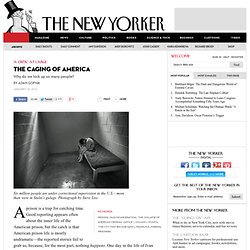
Good reporting appears often about the inner life of the American prison, but the catch is that American prison life is mostly undramatic—the reported stories fail to grab us, because, for the most part, nothing happens. Bank robber-turned-law professor argues importance of 'second chances' for Louisiana prisoners. Shon Hopwood landed in federal prison as a young man after participating in several bank robberies across rural Nebraska.
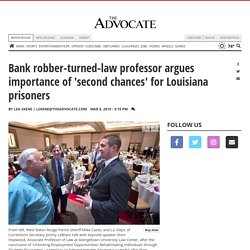
Now he's a practicing attorney and professor at Georgetown Law School. Hopwood related the tale of his transformation Friday to hundreds of people at Baton Rouge's L'Auberge Casino during a seminar focused on boosting opportunities for former Louisiana prisoners transitioning back into society. Hopwood's legal career launched unexpectedly when he started working in the prison law library, not because of any special interest in the law.
He eventually started reading legal texts and filing briefs on behalf of his fellow prisoners. Frances Crook: Our Justice System Should Be Smarter and Smaller - Not Privatised. "Nothing short of shambolic" uttered the softly spoken Sir Alan Beith MP, chairman of the Justice Select Committee, as he was passing judgement on the government's handling of court interpretation services.

This service may sound like a minor detail, but failing to provide an interpreter at the right time can lead to victims and their families, some of whom will have waited years for a case to come to court, see the trial collapse before their very eyes. Similarly, innocent people can languish in remand cells while the courts struggle to find an interpreter. These, according to the committee's report, have formed just part of the litany of failings in a poorly managed outsourcing process, which has wasted taxpayers' money and court time, while being unfair to victims and suspects alike. Eugene Robinson: Defusing a Sociological Bomb. Defusing a Sociological Bomb Posted on Jan 7, 2011 By Eugene Robinson Race still matters in America and justice is not completely blind.
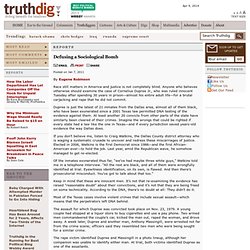
Anyone who believes otherwise should examine the case of Cornelius Dupree Jr., who was ruled innocent Tuesday after spending 30 years in prison—almost his entire adult life—for a brutal carjacking and rape that he did not commit. Dupree is just the latest of 21 inmates from the Dallas area, almost all of them black, who have been exonerated since a 2001 Texas law permitted DNA testing of the evidence against them. Judge who accepted private-prison bribes to send black kids to jail sentenced to 28 years. In 2009, I wrote about Judge Mark A.

Ciavarella, one of two Pennsylvania judges who was paid bribes by a private prison contractor to send black children to prison and keep the for-profit prisons full. Ciavarella, who once sent an African-American child to jail for three months for posting negative comments about her assistant principal on MySpace, has been sentenced to 28 years in prison. White people believe the justice system is color blind. Black people really don’t.
Poli-Sci Perspective is a weekly Wonkblog feature in which Georgetown University’s Dan Hopkins and George Washington University’s Danny Hayes and John Sides offer an empirical perspective on the issues dominating Washington.

In this edition, Sides interviews political scientists Jon Hurwitz and Mark Peffley about their book on how blacks and whites perceive the criminal justice system, and what it implies for Trayvon Martin’s death, George Zimmerman’s acquittal, and the aftermath. The transcript below has been lightly edited. For past posts in the series, head here. Diary of UK Innocence Project 6: Not expecting the unexpected - The Justice Gap. Don’t Blame My ‘Broken Windows’ Theory For Poor Policing. Stop and Frisk Practices. Stop-and-Frisk Campaign: About the Issue The NYPD’s stop-and-frisk practices raise serious concerns over racial profiling, illegal stops and privacy rights.
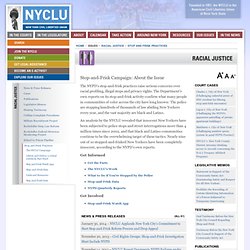
The Department’s own reports on its stop-and-frisk activity confirm what many people in communities of color across the city have long known: The police are stopping hundreds of thousands of law abiding New Yorkers every year, and the vast majority are black and Latino. Addressing the Impact of Wrongful Convictions on Crime Victims. We need to better understand how wrongful convictions affect the original crime victims and improve systemic support available to them.

When a wrongfully convicted individual is exonerated, the original crime victim may experience feelings of guilt, fear, helplessness, devastation and depression. For some victims, the impact of the wrongful conviction may be comparable to — or even worse than — that of their original victimization. These are the findings of an NIJ-funded study examining how wrongful convictions affect the original crime victims, an area in which no prior empirical research had been conducted. Researchers from ICF International conducted in-depth studies to identify the shared experiences and service needs of the original crime victims in 11 cases of wrongful conviction. Wrongful Convictions. When Paul House was finally released from prison in 2008, he was a specter of the man who had been sentenced to death more than 22 years earlier.
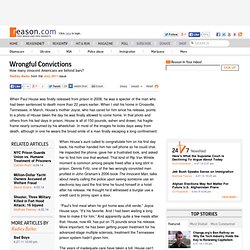
When I visit his home in Crossville, Tennessee, in March, House’s mother Joyce, who has cared for him since his release, points to a photo of House taken the day he was finally allowed to come home. In that photo and others from his last days in prison, House is all of 150 pounds, ashen and drawn, his fragile frame nearly consumed by his wheelchair.